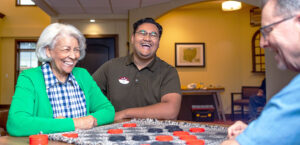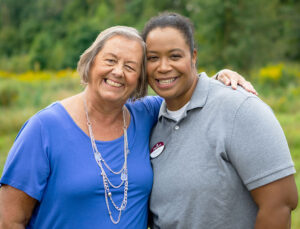Sponsored content by Maxine Nunes, Brand Ave. Studios contributing writer
How can you stay healthy, happy and mentally sharp as you age? An increasing body of research points to the need for an active social life.
But it can be challenging to stay socially active in your senior years. You may lose old friends and find it tough to make new ones. Physical limitations or a medical condition can make it hard to get out and about. It’s easy to become isolated — and that comes with some significant risks to your emotional, mental and physical health.
Socializing can improve or even prevent many of these conditions. And often, for seniors living on their own, one of the best ways to ensure an active social life is moving to a retirement community — one like Primrose where you will find a strong focus on social interaction.
The evidence isn’t just anecdotal. Here’s what studies have shown.

Happier moods — and better physical health
You don’t need a scientist to tell you how a visit from a good friend or getting out in the world can brighten your day — but did you know it can also improve your physical health?
According to the Centers for Disease Control and Prevention, isolation is not only linked to psychological issues, but more surprisingly to a greater risk of heart disease and stroke.
And it’s not enough to sit around with your family or spouse staring at the TV. According to a study published in the Journals of Gerontology, to improve your health and mood, socializing should also involve some movement or increase in physical activity.
“Following recent world events, we were able to see the detrimental effects of isolation in elders and not receiving proper levels of stimulation in their homes. At Primrose, rich social experiences and robust lifestyle options, accentuating wellness across several dimensions, create a lifestyle of joy and wellbeing for our residents within our communities,” said Melanie Perry, memory care coordinator at Primrose.
Memory and cognition
About 11% of senior citizens in the U.S. suffer from Alzheimer’s disease or other types of cognitive impairment — but a study, conducted at the Rush Alzheimer’s Disease Center in Chicago, found that seniors who were socially active were less likely to suffer from cognitive decline as they aged. Similarly, researchers at Penn State’s Center for Healthy Aging found that for several days after engaging in a pleasant social activity, older people had better results on cognitive tests.

Should you move to a retirement community?
If you’re thinking about moving to a retirement community, make sure to choose one that has the social activities you need to stay engaged.
At Primrose, for example, opportunities to socialize abound — game nights, exercise classes, outings to interesting places and events, and more. There are also lounges, a café, even a pub/bistro, where you can just hang out in a friendly atmosphere. And in the dining room, it’s always a pleasure to enjoy chef-crafted meals in the company of others.
“We have former librarians managing our onsite libraries, former business owners serving as Resident Ambassadors, and former teachers and professors leading Primrose Senior University classes,” said Jessi Weldon, executive vice president of sales and marketing. “It’s always a joy to watch residents continue to find purpose doing what they’ve loved for so many years, and it’s even more rewarding to see these individuals learn a new skill or hobby. There are so many social and purposeful opportunities that come with the Primrose lifestyle.”
For more information, please visit primroseretirement.com.
